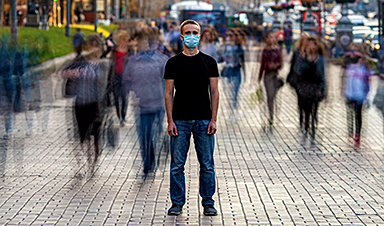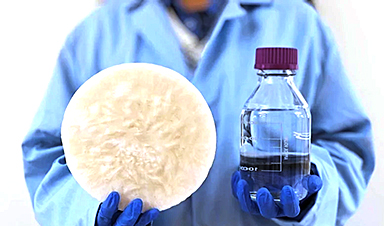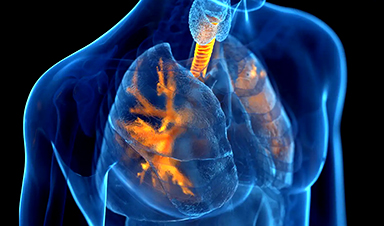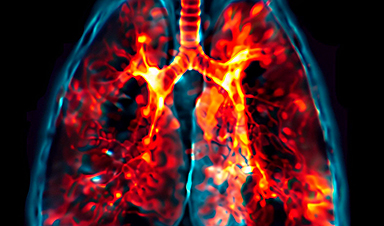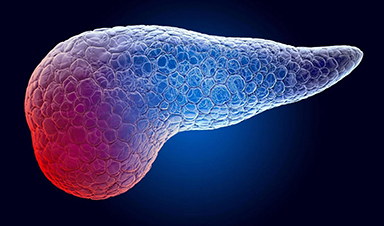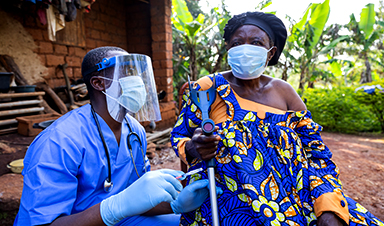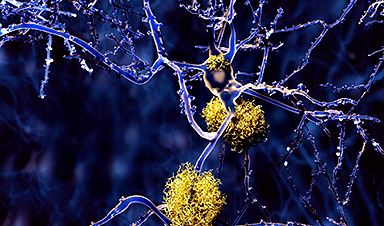The School of Chinese Medicine at Hong Kong Baptist University (HKBU) found that 55% of the patients who sought medical treatment from the HKBU Chinese Medicine Telemedicine Center Against COVID-19 during the fifth wave of the COVID-19 pandemic continued to experience at least one long COVID symptom for six months to a year after diagnosed with an infection. The most common symptoms are fatigue, brain fog and cough.
The research findings have been published in a number of papers in international academic journals including the Journal of Medical Virology and the American Journal of Chinese Medicine.
HKBU established the HKBU Chinese Medicine Telemedicine Center Against COVID-19 in 2021 during the fifth wave of the COVID-19 pandemic in Hong Kong to provide free telemedical services for COVID-19 patients. Making reference to the treatment protocols and clinical experiences in Mainland China, the expert team of HKBUs School of Chinese Medicine formulated the Chinese Medicine Clinical Guidelines for COVID-19 in Hong Kong as the University’s clinical diagnosis and treatment standards for COVID-19. The Telemedicine Center follows the guidelines to provide diagnosis, treatment, and prevention services to COVID-19 patients, close contacts, and caregivers.
Coughing is the most common early symptom of infection
The HKBU research team led by Professor Bian Zhaoxiang, Director of the Clinical Division at the School of Chinese Medicine, conducted a retrospective study using patient statistics collected by the Telemedicine Center during the fifth wave of the pandemic. The team analyzed the symptoms in the first four weeks of about 13,000 patients who were infected with COVID-19 from mid-March to early May in 2022 and underwent home isolation.
The results showed that 93% of patients experienced at least one symptom. The most common symptoms during the first week of infection were cough (91%), sputum (75%), dry throat (50%) and sore throat (44%). 17% of patients still had these symptoms four weeks after infection. Although the symptoms gradually subsided over time, the prevalence of fatigue increased.
Chinese medicine accelerates viral clearance
Among this batch of patients, the research team selected 311 patients who had taken Chinese medicine for five days within 10 days after diagnosis, and another 311 patients who had not taken any Chinese medicine during the same period to evaluate the efficacy of Chinese medicine.
The results showed that patients who took Chinese medicine within 10 days after COVID-19 infection needed an average of seven days to test negative in rapid tests, and experienced an average of four symptoms, which were significantly milder compared to patients who didn’t take Chinese medicine. The average time to test negative for patients who did not take Chinese medicine was eight days, and they experienced an average of 11 symptoms. The results show that Chinese medicine is an effective treatment for COVID-19 infection.
Over half of the patients experience long COVID after six months
The research team conducted a follow-up telephone survey from November 2022 to January 2023 with 6,242 COVID-19 patients who sought medical consultation at the Telemedicine Center between December 2021 and May 2022 to understand their symptoms and risk factors after six months to a year of infection.
The study found that 55% of patients still experienced at least one long-term symptom, i.e. “long COVID” or “post-COVID syndrome.” The most common symptoms were fatigue (36%), brain fog (34%) and cough (31%). Furthermore, females, middle-aged persons, obese people, those with comorbidities such as ophthalmology or otorhinolaryngology diseases, digestive system diseases, respiratory diseases, hyperlipidemia and cardiovascular diseases, and patients with more initial symptoms were more likely to develop long COVID. However, there was no significant correlation between taking three or more doses of vaccine and the occurrence of long COVID.
Professor Bian said, “HKBU established the Telemedicine Center during the COVID-19 outbreak to provide free treatments for COVID-19 patients. We analyzed the Center’s data to deepen the medical community’s understanding of the symptoms during the early and middle stages of COVID-19 infection as well as the post-COVID syndrome. It allows the public to understand the effectiveness of Chinese medicine in treating COVID-19. The study also shows that the tele-services of Chinese medicine can be an important component of Hong Kong’s health care and disease prevention system.”
More information: Jingyuan Luo et al, Weekly symptom profiles of nonhospitalized individuals infected with SARS‐CoV‐2 during the Omicron outbreak in Hong Kong: A retrospective observational study from a telemedicine center, Journal of Medical Virology (2022). DOI: 10.1002/jmv.28447
News
Baffling Scientists for Centuries: New Study Unravels Mystery of Static Electricity
ISTA physicists demonstrate that contact electrification depends on the contact history of materials. For centuries, static electricity has intrigued and perplexed scientists. Now, researchers from the Waitukaitis group at the Institute of Science and [...]
Tumor “Stickiness” – Scientists Develop Potential New Way To Predict Cancer’s Spread
UC San Diego researchers have developed a device that predicts breast cancer aggressiveness by measuring tumor cell adhesion. Weakly adherent cells indicate a higher risk of metastasis, especially in early-stage DCIS. This innovation could [...]
Scientists Just Watched Atoms Move for the First Time Using AI
Scientists have developed a groundbreaking AI-driven technique that reveals the hidden movements of nanoparticles, essential in materials science, pharmaceuticals, and electronics. By integrating artificial intelligence with electron microscopy, researchers can now visualize atomic-level changes that were [...]
Scientists Sound Alarm: “Safe” Antibiotic Has Led to an Almost Untreatable Superbug
A recent study reveals that an antibiotic used for liver disease patients may increase their risk of contracting a dangerous superbug. An international team of researchers has discovered that rifaximin, a commonly prescribed antibiotic [...]
Scientists Discover Natural Compound That Stops Cancer Progression
A discovery led by OHSU was made possible by years of study conducted by University of Portland undergraduates. Scientists have discovered a natural compound that can halt a key process involved in the progression [...]
Scientists Just Discovered an RNA That Repairs DNA Damage – And It’s a Game-Changer
Our DNA is constantly under threat — from cell division errors to external factors like sunlight and smoking. Fortunately, cells have intricate repair mechanisms to counteract this damage. Scientists have uncovered a surprising role played by [...]
What Scientists Just Discovered About COVID-19’s Hidden Death Toll
COVID-19 didn’t just claim lives directly—it reshaped mortality patterns worldwide. A major international study found that life expectancy plummeted across most of the 24 analyzed countries, with additional deaths from cardiovascular disease, substance abuse, and mental [...]
Self-Propelled Nanoparticles Improve Immunotherapy for Non-Invasive Bladder Cancer
A study led by Pohang University of Science and Technology (POSTECH) and the Institute for Bioengineering of Catalonia (IBEC) in South Korea details the creation of urea-powered nanomotors that enhance immunotherapy for bladder cancer. The nanomotors [...]
Scientists Develop New System That Produces Drinking Water From Thin Air
UT Austin researchers have developed a biodegradable, biomass-based hydrogel that efficiently extracts drinkable water from the air, offering a scalable, sustainable solution for water access in off-grid communities, emergency relief, and agriculture. Discarded food [...]
AI Unveils Hidden Nanoparticles – A Breakthrough in Early Disease Detection
Deep Nanometry (DNM) is an innovative technique combining high-speed optical detection with AI-driven noise reduction, allowing researchers to find rare nanoparticles like extracellular vesicles (EVs). Since EVs play a role in disease detection, DNM [...]
Inhalable nanoparticles could help treat chronic lung disease
Nanoparticles designed to release antibiotics deep inside the lungs reduced inflammation and improved lung function in mice with symptoms of chronic obstructive pulmonary disease By Grace Wade Delivering medication to the lungs with inhalable nanoparticles [...]
New MRI Study Uncovers Hidden Lung Abnormalities in Children With Long COVID
Long COVID is more than just lingering symptoms—it may have a hidden biological basis that standard medical tests fail to detect. A groundbreaking study using advanced MRI technology has uncovered significant lung abnormalities in [...]
AI Struggles with Abstract Thought: Study Reveals GPT-4’s Limits
While GPT-4 performs well in structured reasoning tasks, a new study shows that its ability to adapt to variations is weak—suggesting AI still lacks true abstract understanding and flexibility in decision-making. Artificial Intelligence (AI), [...]
Turning Off Nerve Signals: Scientists Develop Promising New Pancreatic Cancer Treatment
Pancreatic cancer reprograms nerve cells to fuel its growth, but blocking these connections can shrink tumors and boost treatment effectiveness. Pancreatic cancer is closely linked to the nervous system, according to researchers from the [...]
New human antibody shows promise for Ebola virus treatment
New research led by scientists at La Jolla Institute for Immunology (LJI) reveals the workings of a human antibody called mAb 3A6, which may prove to be an important component for Ebola virus therapeutics. [...]
Early Alzheimer’s Detection Test – Years Before Symptoms Appear
A new biomarker test can detect early-stage tau protein clumping up to a decade before it appears on brain scans, improving early Alzheimer’s diagnosis. Unlike amyloid-beta, tau neurofibrillary tangles are directly linked to cognitive decline. Years [...]







